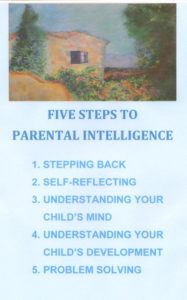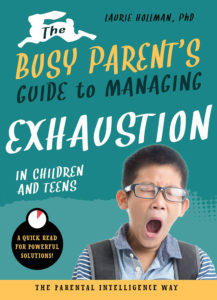Identifying and Managing Exhaustion in Kids
Some kids get exhausted. Exhaustion means extreme mental or physical fatigue.
It also results from enervation, a feeling of being drained of energy or vitality; a weariness and fatigue that occurs when kids feel depleted due to stress.
Different youngsters with a wide range of needs, beliefs, opinions, imaginings, intentions and goals may be suffering from exhaustion for a vast array of underlying reasons and problems.
These need to be identified by parents who with Parental Intelligence become “meaning makers” empowered to read the thoughts and feelings underlying their child’s exhaustion.
With Parental Intelligence, mothers and fathers listen attentively to their children’s needs and goals and collaborate with to meet those goals.
That is, exhaustion carries a message—it’s an invitation for understanding.

These 5 steps help you unlock your Parental Intelligence.
The five steps of Parental Intelligence provide a road map to help you understand the meaning of your child’s exhaustion. Finding that meaning is the only way to successfully figure out how to reduce and end this exhaustion.
Otherwise, you are floating around in the dark telling your child uselessly to get more sleep and he or she can’t follow your dictates even though he or she’s exhausted and wants to.
Why? Because you and the child don’t know the reasons for the exhaustion. This must be puzzled out if you want to journey to the solution.
Here are two excerpts from my book, The Busy Parent’s Guide to Managing Exhaustion in Children and Teens: The Parental Intelligence Way

Chapter Two
Learning About the Exhausted Child:
The Parental Intelligence Way
Two-year-old Cal is curled up on the couch at five o’clock in the afternoon, sound asleep, when his mother returns from work. It’s the second time this week she’s discovering him in a deep sleep at this odd time of day. He usually races to greet her when she arrives home from work. She is not only disappointed in missing the warm hello hug but is also concerned and worried that he’s oversleeping. Daria, the child-minder that Cal’s mother has come to rely on since she went back to work when Cal was four months old, assures her that Cal has had his nap and played happily during the day; Daria, too, finds this exhaustion bewildering.
Strongly committed to using the five steps of Parental Intelligence, Cal’s mother quickly turns to step one, stepping back. This means she pauses without reacting quickly in order to consider the major premise of Parental Intelligence—that a child’s behavior has meaning. She attempts to experience her wide range of emotions without taking immediate action. If she didn’t pause but rushed to awaken her son without suspending judgment, he might see her panic and become unnecessarily distressed.
Chapter Three
Learning about Adolescent Exhaustion:
the Parental Intelligence Way
Leslie
Fourteen-year-old Leslie drags herself up the stairs to land on her bed right after school on most days, falling into a deep sleep that can last for three hours. She’s always shocked that it’s six o’clock when she opens her drowsy eyes and that her mother is calling her down to dinner. Like most good academic kids, she can’t sleep like this every day, because she is a member of the debate team and editor of the school paper. She almost always feels exhausted. Sometimes she falls asleep in class, only to get kicked under her desk by her friend to wake her up. At night she sleeps like a rock. Her mother thinks her problem is that she’s picking the wrong friends who aren’t as smart and goal oriented as she is. She fears her daughter is getting lazy. But her mother is off the mark this time.
Leslie and her mother have constant arguments about these friends. Her mother is afraid she’s learning bad habits and is going to get into trouble sexually if she doesn’t regroup with her old steady friends, who are polite and steadfast with their schoolwork. But Leslie needs to experiment with different kids. She feels it’s really harmless, but she and her mother of course disagree.
Leslie spends hours a day preoccupied with her anxieties: she worries about expiration dates on foods, avoiding any leftovers, and separates each food from the others on her plate. She also spends a lot of time lining up her old stuffed animals in a specific order on her shelf. She’s begun skipping lunch at school entirely, because she likes eating by herself to avoid inquiries from her friends about these habits. But they all actually accept her compulsions and treat her normally. Her mother doesn’t realize that she’s adding to Leslie’s obsessive thoughts by constantly telling Leslie to wash her hands after school and to avoid those nasty germs all around her that will get her sick. Leslie has now added this obsession to her repertoire and uses her shirt to open doors; she doesn’t want to touch the doorknobs in school that everyone is handling. She’s become what kids call a germaphobe.
Leslie is well liked and no one except her therapist knows about the excessive sleep. Her exhaustion is hidden, because her mother thinks she is doing homework and visiting kids on the computer. But her mother is still worried about her. Leslie’s excessive sleep interferes with her homework, which causes its own problems because Leslie is a good student with a lot of advanced placement classes. If Leslie doesn’t write something perfectly, according to her excessive standards, she rips up her work and rewrites it. Writing on the computer helps her, but then she gets preoccupied with the margins, spacing, and spellcheck—once again deleting all her work until it’s perfect. On the standardized tests that have become so common, she must pencil in the little answer circles perfectly or she erases her work and does it over. This takes time from solving the problems that she’s supposed to be focusing on.
What does exhaustion have to do with OCD (obsessive-compulsive disorder)? Well, Leslie is avoiding her obsessive thoughts and compulsions just to get a mental break from them. Sleep is her escape.
These two examples of very different children with sleep problems for very different reasons demonstrate how parents with Parental Intelligence understand their unique and individual child’s struggle with exhaustion.
These are devoted parents, just like you, who find a way not only to understand but to solve their child’s exhaustion.
You can do this, too.
Burnout and Depression
When a child’s life consists of persistent and chronic school stress, the end result is burnout. Lethargy and excessive tiredness are often the complements of loss of enthusiasm and tense nervous energy.
The result for many children is an inability to relax and replenish energy reservoirs—both physically and emotionally—which leads to a
- lack of productivity
- a lack of concentration
- a lack of organization
- a lack of cognitive and physical achievement
The child’s brain can be overloaded leading to a kind of burn-out breakdown.
How do you identify such depression with exhaustion?
- find decreased performance and alertness
- memory and cognitive impairment
- weight gain
- diminished interest in pleasurable activies
- fatigue and loss of energy nearly every day
- mood disturbances
Stress that overwhelms a child’s ability to adapt to their everyday life may lead to exhaustion.
When the negative stress response occurs you will find
- frustration with one’s tasks
- difficulty facing responsibilities
- emotions such as fear, pain and frustration
- general irritability
- hyper-excitation
- fatigue
Could your child be suffering from
Information overload?
Emotional overload?
Responsibility overload?
Take a look with your child at their
- regular hours of sleep,
- their potential overuse of technology,
- the strain of new school schedules to meet the demands that the COVID 19 virus demands,
- their capacity for emotional distance due to social distance,
- and their capacity for pleasure and enjoyment.
WHEN YOU AND YOUR CHILD AND TEEN CALMLY DISCUSS THEIR FATIGUE AND DISCOVER WHAT THE CAUSES ARE YOU WILL NOT ONLY ELIMINATE EXHAUSTION BUT INCREASE YOUR PARENT-CHILD BOND.